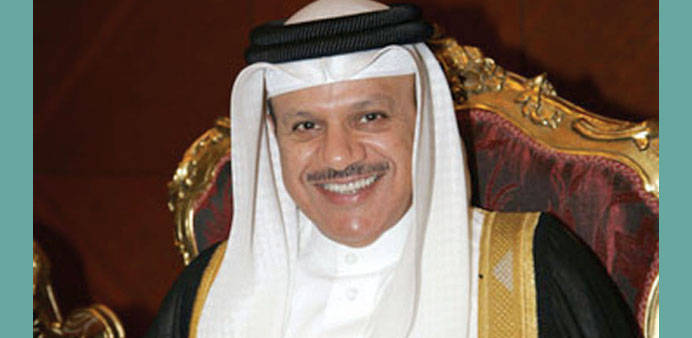QNA/Doha
The GCC Secretary General Dr Abdul Latif bin Rashid al-Zayani praised the outstanding efforts made by Qatar during its presidency of the 35th session of the GCC Supreme Council, and the efforts exerted by HH the Emir Sheikh Tamim bin Hamad al-Thani and the government to push forward the GCC strategy.
In an interview with Qatar News Agency (QNA), the GCC Secretary General highlighted the “constructive co-operation and the great effort” made by Qatar’s Foreign Ministry to host meetings of the GCC ministerial councils and committees, which contributed to strengthening the GCC.
He stressed the importance of the upcoming GCC summit in Saudi Arabia in light of the political, security and economic developments in the region, adding that the summit will effectively contribute to deepening GCC relations and promoting co-operation and integration in all areas, as well as addressing the risks surrounding the GCC countries in the current circumstances.
He stressed that the GCC countries are fully aware of the political, security, economic and social challenges and are working hard to take all the necessary measures to maintain security and stability and to defend its interests and achievements.
The GCC secretary general said that the meetings of the Leaders of the GCC countries always reflect their keenness to ensure prosperity and welfare for all GCC peoples, with a special attention to the youth.
He noted that the GCC General Secretariat is currently completing the implementation of the Supreme Council’s decisions concerning the youth and developing their talents and capabilities.
He added that the General Secretariat held five youth workshops resulting in the issuance of several important recommendations that were submitted to the respective ministerial committees in order to activate them through programmes and plans that fulfil aspirations of young people.
He pointed out that the Secretariat is also working on completing and developing a study on the GCC youth activities. The Secretariat also reviews all issues of interest to young people on a regular basis in order to determine the topics to be submitted to the GCC summit.
Regarding the GCC integration, al-Zayani said that the GCC States had made taken very important steps in this direction.
He said that GCC States were able to establish a GCC common market and achieve economic citizenship which allowed the application of equality between GCC citizens in owning property, residency, and pursuing professions and trades as well as in receiving social services such as education, health, insurance and social insurance.
The Customs Union has facilitated an increase in the trade exchange between the Council’s States which reached in 2014 about $140bn. It was $6bn when the GCC was established.
For the obstacles that the GCC seeks to address, Dr al-Zayani said that the Council seeks to be an economic power and a bloc that can deal effectively and efficiently with global and regional economic blocs and in the interests of the GCC people.
He also emphasised that the Council is working on deepening economic integration between its members, overcoming some of the obstacles facing the Customs Union, increasing the role of the GCC private sector in all development areas and providing appropriate investment climate for it to establish joint ventures, directing an important part of the GCC investments into the Member States especially in the industry, housing, tourism and services fields, activating the role of financial markets in the Member States, implementing the decisions of the Supreme Council and unifying the legislations and laws.
Regarding the GCC Railway project, Dr al-Zayani said that it is an important strategic project and will take the GCC countries to an important economic phase and will contribute to facilitating commercial traffic and the movement of citizens and residents, adding that the project has now entered the detailed engineering design phase scheduled to be completed in 2018.
The General Secretariat, he said, is following up the implementation of this strategic project with the member-states, and is holding regular meetings of the project’s commission.
He also explained that the Ministerial Council recently adopted a resolution to prepare a study for the establishment of the GCC railway authority.
Regarding the GCC-Iranian relation, the secretary general said it could be constructive and beneficial relationship for both sides and the region in general, and it should be based on the principles of good neighbourliness and mutual co-operation and serve the interests of both sides and maintain the security and stability of the region.
He added that although what the GCC showed a sincere desire to establish friendly relations with the Iran, Tehran regrettably insisted more on its positions, adding that it is still insisting on its occupation of the UAE’s islands (Greater Tunbs, Lesser Tunbs and Abu Musa) and refuses to respond to GCC countries’ call to resolve this issue either by negotiation or by going to the International Court of Justice.
He also said that Iran continues to intervene in the internal affairs of the GCC countries and support terrorist organisations with money and weapons to destabilise the security and stability of the GCC countries.

GCC Secretary General Dr Abdul Latif bin Rashid al-Zayani
